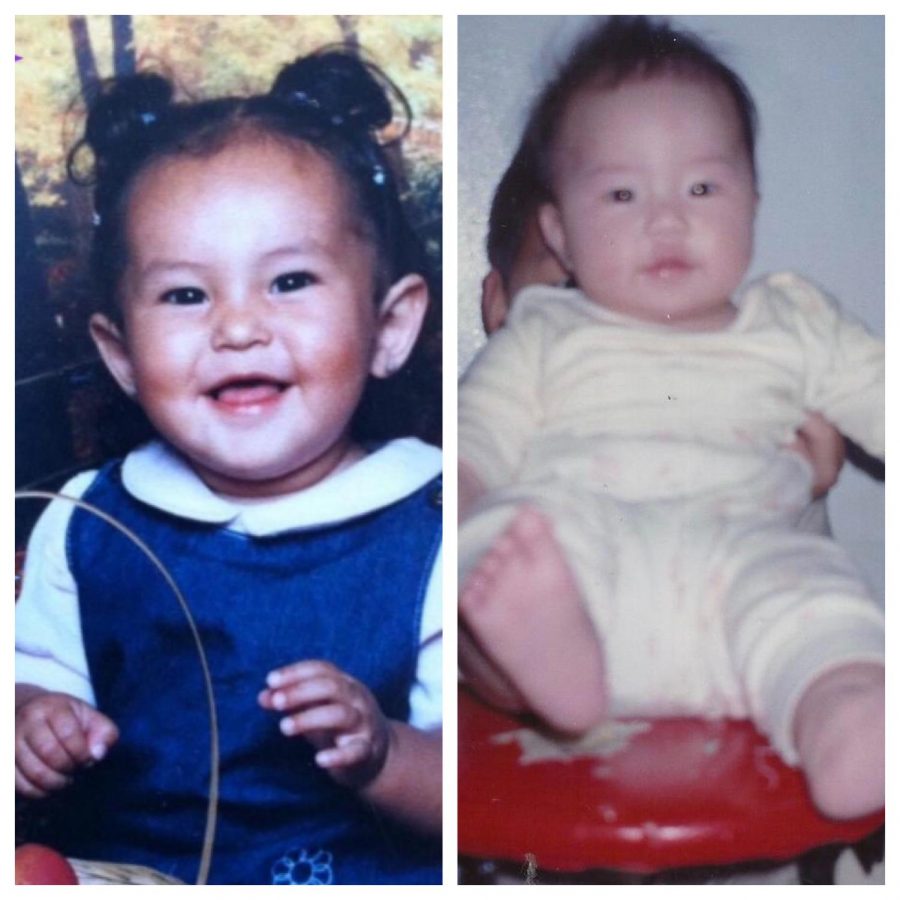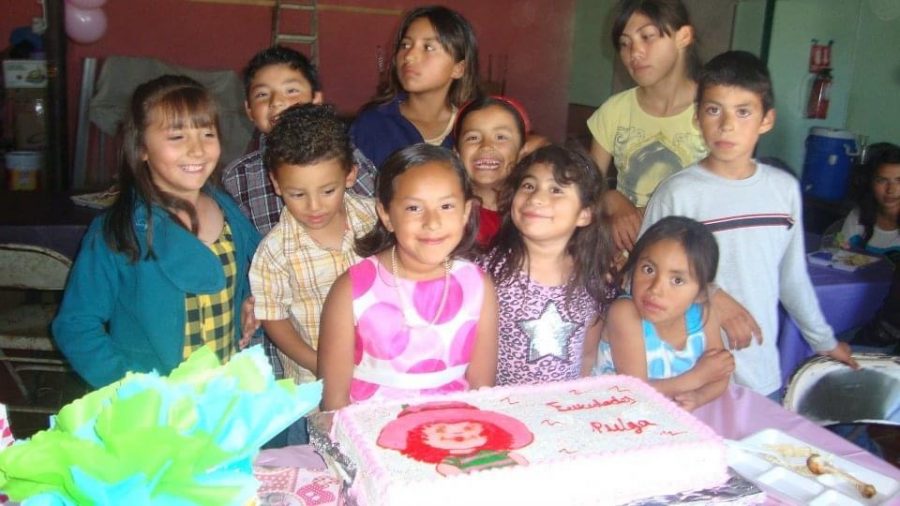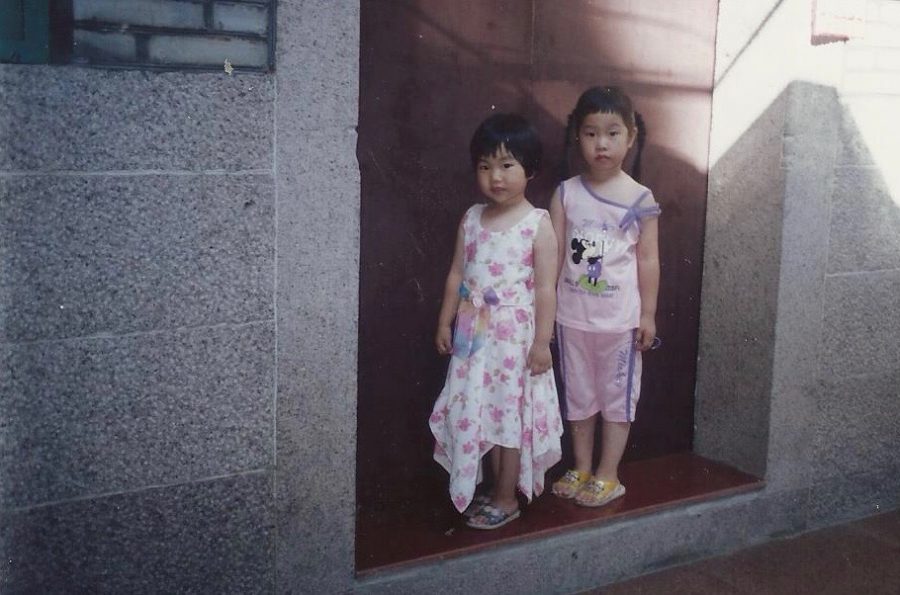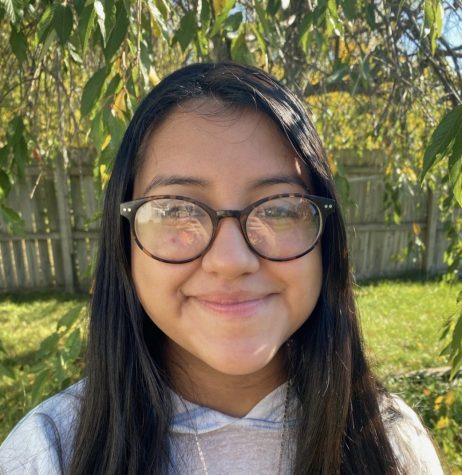Being Bilingual: Insecurities, Identity, and Racism
Juniors Miri Olivares and Jamie Zheng recall coming to America, learning English, and overcoming the challenges that arose along the way.
Photos provided by Miri Olivares and Jamie Zheng
Juniors Miri Olivares and Jamie Zheng recount their stories of first coming to the States and the journey of learning English.
May 19, 2020
Language is something that connects us. No matter where we are from, it is with the power of language that we are able to express what we feel and think. Some people though, such as juniors Miri Olivares and Jamie Zheng, have the great gift of meeting a second language face-to-face.
Miri: My New Life
Jumping straight into seventh grade at North Side Middle School, with little to no English fluency, junior Miri Olivares didn’t know what to expect.
Nonetheless, this wasn’t her first time in the States.
“I came here twice. I was barely a year old the first time I came,” Miri recalled. “Then I left when I was five and then I came back when I was about to finish seventh grade.”
Miri was born in Rincón de Ramos, Aguascalientes in Mexico, but her family decided to move their whole life to the United States in order to seek out job opportunities.
My Insecurities
When she came to the U.S., the only language she knew was Spanish. In between the times that she came and left, Miri lost all the traces of the broken English she had learned when she was five.
Still, when she started school in the States during her seventh grade year, she was determined to learn English.
“I can’t say I caught onto it really fast, but at the same time, I was talking Spanish at home, so at one point, it was hard to speak English and Spanish because I would get my words confused,” Miri said.
Confusion wasn’t the only obstacle that Miri experienced. Insecurity took over. The fear that she would make a mistake or get laughed at by others simply because she didn’t know English was stifling.
“There were a lot of people who told me not to be afraid to make mistakes. It was more of me putting myself down,” Miri said. “I feel like insecurity is definitely the main aspect that keeps people from learning a new language.”
Even with her insecurities, it only took Miri eight months to be fully fluent in English because she took advantage of every resource that was at her hands: from her ESL teachers or her cousins to even the children’s TV show “Dora the Explorer.”
Am I Mexican or American?
As time went on, Miri realized another struggle: how to balance both languages as well as her identity as a Mexican and as an American, a common occurrence in those who speak multiple languages.
“I feel like sometimes you don’t even know if you’re Mexican or American. It’s like you’re stuck in the middle,” Miri said. “That’s one of the reasons as to why a lot of both cultures will look at you and think you’re weird because of the fact that you like different aspects from both cultures.”
When these feelings take hold of her, Miri uses it as an opportunity to understand the importance of keeping her roots alive. But she is careful to also nurture and connect with the side that she didn’t meet until seventh grade: being bilingual. A side that still has its negatives—even now.
Being Bilingual
Being bilingual can oftentimes bring negativity. Too many people assume that just because someone speaks Spanish, that they don’t speak English, or even some other language.
“It is negative at times because negative people come at you,” Miri said. “I’ve seen videos where people tell those who speak Spanish that they are in America and that they should be speaking English.”
Despite the negative opinions of others, Miri plans to change the way Mexican Americans are viewed. By pursuing her dream.
Miri plans to attend IU Bloomington for criminal justice. With the skill of being bilingual, Miri wants to use it to the best of her ability while pursuing her dream.
“Speaking both languages would help me a lot since I’ve seen cases where there might be people who don’t speak English who are suspects in a case,” Miri said. “and them not being able to defend themselves, so being able to speak more than one language would give me the chance to speak up for them if they don’t have the ability.”
Jamie: When I Learned English
Junior Jamie Zheng was born in the United States, but when she was a baby, her family moved to Fuijian, China until she was ready to start kindergarten. Then they made the move back to the U.S.
“I was surrounded by new people and I didn’t completely understand what they were saying,” Jamie said. “This was definitely a challenge for me.”
Moving back to the U.S., away from her home in Fuijian, meant going to an American school and learning English, a language she wasn’t fully accustomed to.
Going on three years old, when she came to the U.S., Jamie was only fluent in Chinese.
“I was terrified. I remember I started crying because I didn’t want to leave my sister when going to school,” Jamie said. “I was also really quiet because I didn’t know what people were saying to me.”
But, even when Jamie was scared, she didn’t let that stand in her way. With the help of her older sister, it took Jamie less than a year to learn English.
I Act Too American, or Too Asian
Jamie and her family still visit Fuijian periodically, but even when she visits, she has trouble balancing both languages.
“Now, I know more English than Chinese, so sometimes I blank out on certain words,” Jamie said. “I don’t really talk to a lot of people there now because it’s hard for me to pick it up fast. Sometimes I even feel that I act too American for the Chinese and too Asian for an American.”
In times like these, Jamie turns to both American holidays and Chinese holidays such as the Chinese New Year. She notes that it’s important for her to still connect with her Chinese heritage.
Still, she explained, “Knowing two languages can help you experience many things. For example, in the Chinese culture, you don’t celebrate Christmas, so knowing both cultures has definitely allowed me to experience holidays that I can’t experience in one or the other.”
Being Bilingual
Because her parents predominantly speak Chinese, Jamie knows that they rely on her to translate for them on a pretty regular basis. This is a responsibility that many children and teens of immigrant parents take on.
For this reason, she knows that it is really important for her to continue speaking and expanding her Chinese.
“It’s really important for me to engage with the Chinese language because that’s my parent’s main language and all of my family’s,” Jamie explained. “So, it’s important for me to still be able to communicate with them.”
Even with all this, Jamie explained that she still feels cornered and shy when speaking Chinese. An insecurity that school doesn’t make any better.
“Some people are kind of racist about it. At school some people ask me to speak Chinese and I say, ‘no,’” Jamie said. “It’s because sometimes I feel like they just want to know the bad words or cuss words. If they were really interested, they would not only want to know those words.”
I Feel Pressure and Pride
Nonetheless, Jamie is confident in her belief that the ignorance of others can’t take away the pride she has for her Chinese heritage.
“I definitely do feel pressured [to be successful] because my parents worked really hard and they want me to become successful,” Jamie said.
With her hardworking parents, owners of the Elkhart restaurant, Yummy Chinese, as her example, Jamie plans on attending college to study Forensic Psychology.
“Being multicultural really opens a lot of doors,” Jamie said. “It allows me to understand more people and it has also made me a very patient person when it comes to meeting someone that’s not familiar with something.”










